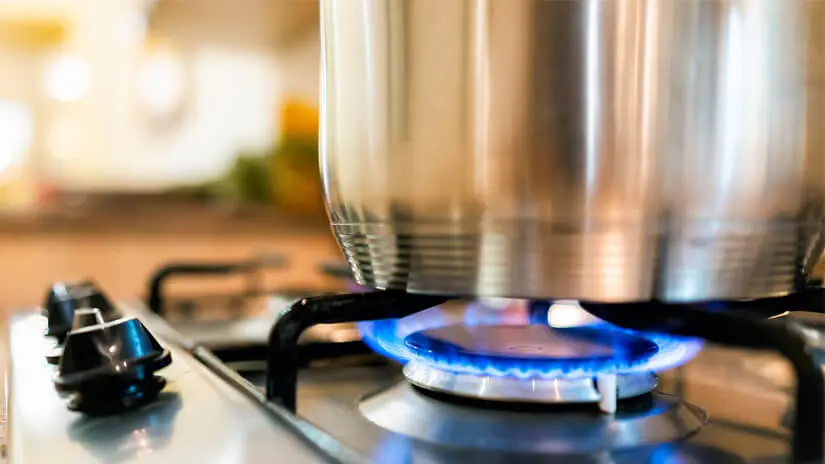Many people choose natural gas for its abundance and efficiency. Setting up a gas plant requires half the resources and time compared to a coal plant, making it a cost-effective energy source.
Another advantage is that it is a better option for environmental benefits. The carbon emission in low gas seems better in the long term, considering how much the climate changes yearly.
If used wisely, natural gas can sustain industries for many years, supporting economic growth.
If you use gas at home, be aware of the risks like leaks, carbon monoxide poisoning, or malfunctioning appliances. Ensure safety by storing gas cylinders in shaded areas, away from direct sunlight, petrol, flammable liquids, and aerosols.
When you suspect a gas leak, whether minor or major, you have several options to protect yourself and your property. The focus is to act fast and not ignore a potentially hazardous gas plumbing issue. Your number one priority is your safety.

- Immediately turn off the gas supply in your home. You can do this at the gas meter or cylinder.
- Turn off your gas appliances and electrical appliances. Make sure to turn off the pilot lights. Remember the pilot light on the water heater and other household appliances.
- If the gas smell comes from a gas appliance such as your gas stove or gas heater or a pipe connecting your gas appliance to the gas meter, turn the control valve handle at the gas meter to the off (horizontal) position.
- Open all doors and windows and ventilate the area with fresh air.
- Find the number of a licensed gas fitter and make an appointment with an emergency plumbing team to come out. They should provide same day service.
- Call 000 if you believe you or your household is in immediate danger.
- If you can see naked flames, safely put out the fire using a fire extinguisher.
- Make sure you leave the area so you are not exposed to the gas fumes
What are the signs of a gas leak?
Inside
- Strong methane smell of ’rotten egg’ odour
- A hissing sound coming from an appliance
- Plants dying (if you notice dead plants not because you didn’t water them, check out for leaks)
- Household pets vomiting or acting lethargic
- Dizziness and difficulty breathing
Outside
- Bubbles from the gas pipe
- Plants and trees dying
- Strange air movement
- The dry patch of ground where the soil is usually moist
What does gas smell like?
Natural Gas is typically odourless and colourless. However, it contains a chemical called Mercaptan that gives off the smell of rotten eggs. This chemical is pretty strong and is purposely added to Natural gas to alert you if there is a gas leak in your home.
Gas leaks are quite noticeable because of the rotten egg scent from the added Mercaptan. This chemical makes it possible to detect otherwise undetectable toxic emissions.
Is it bad if you can smell gas in your house?
It is considered harmful if you notice the smell of gas in your house. Gas is meant to be contained in the proper piping and not out in the open air to be inhaled. It is a dangerous chemical and is highly flammable. If a flame is ignited nearby, you are at risk of an explosion. Even the slightest leak can silently and quickly fill up an entire room.
A gas leak is considered a plumbing emergency. Your Australian gas distributor and a licensed plumber who can carry out gas work should attend to it immediately.
What does it mean if I smell gas in my house?
Smelling an odour similar to rotten eggs could indicate a gas leak. There may be a hole in a gas pipe or appliance, or your gas connection may be faulty. The gas supply to your meter may leak, or you may need to check the pilot lights of the gas burners.
Whatever the reason is for the hissing noise coming from your cooktop or the smell of rotten cabbage that you can’t seem to get rid of, it’s essential to get it checked sooner rather than later.
Can a gas leak make you feel ill?
Smelling gas is not good for your life or property. It can also be hazardous to your health, particularly harmful to those with respiratory problems, young children, and the elderly.
If you smell gas inside your home, it’s crucial to move away from the source immediately. Suspect an issue with gas lines or appliances? Ensure doors and windows are open to allow in fresh air and maintain ventilation.
What can you do if you smell gas outside your home?
If you notice an emergency gas leak from the gas meter or main gas line, contact your gas distributor or retailer and organise an emergency appointment. Stay safe by staying away from the exposed gas.
Remember: Do not look for a gas leak with a naked flame or another ignition source. Do not operate electrical equipment close to a gas leak. Don’t turn on or light switch off any lights, use a telephone, or use a flashlight, at the risk of causing a spark that could start a gas fire. Don’t smoke, light matches, or use a cigarette lighter inside or on the property.
Contact a Licensed Gasfitter.
You need to call a plumbing service specialising in gas works for all gas leak emergencies.
A licensed gas fitter can help and provide emergency services for all major gas leaks and install appliances. They can also install and disconnect all gas appliances and pipes, assist with your gas meter needs, and keep your family and home safe.














